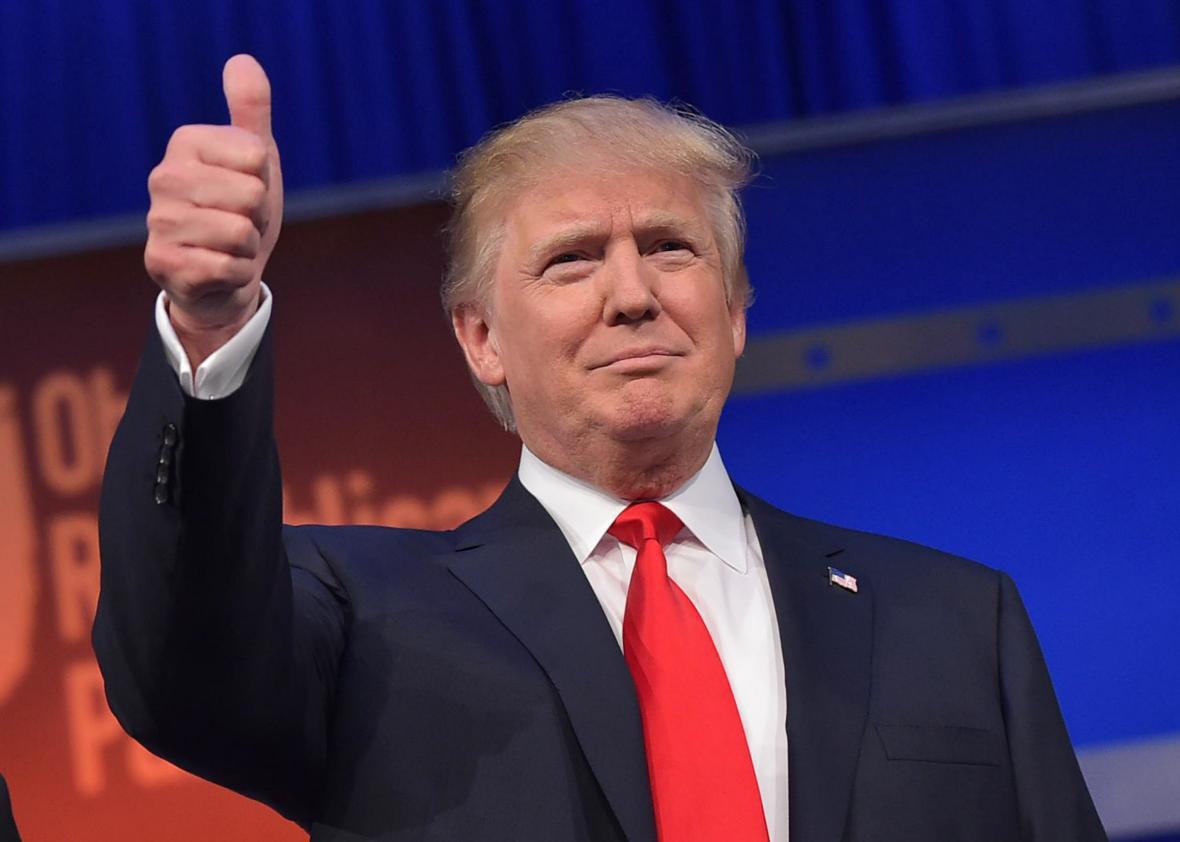Thursday’s GOP debates produced a slew of surprises—Carly Fiorina’s demolition of her opponents at the kids’ table, John Kasich’s stirring defense of Medicaid, and Fox News’ incredible job wrangling a historically crowded field, to name just a few. The night also produced one predictable outcome: A massive chasm between how pundits and journalists reacted to Donald Trump’s performance and how the public at large did.
The chattering class was near unanimous in its verdict: Trump lost. “The Trump bubble will burst,” Politico’s Mike Allen confidently declared after the debate. The current GOP frontrunner’s momentum has stalled and is “[definitely] not going up,” predicted ABC News’ Matthew Dowd. “Trump was a clown show,” tweeted Fox News contributor Stephen Hayes. “The last month has been Trump making the rest of the field look small; [Thursday] was the opposite,” wrote National Review’s Rick Lowry. “Finally, perhaps we’ve really seen peak Trump,” concluded the Weekly Standard’s Bill Kristol.
Much of the public, though, saw something else entirely: A Trump victory. As of late Friday morning, more than 46 percent of the nearly half-million votes cast in a Drudge Report poll asking who won the prime-time debate went to the once-and-future reality TV star. In Time magazine’s version of the survey, the real estate mogul claimed 47 percent of the more than 70,000 online responses. And even here at Slate—not exactly the friendliest playing field for Trump—the self-hype-man with the $10-million private jet garnered 39 percent of the roughly 44,000 votes that had been cast. In all three polls, meanwhile, the runner-up barely broke into the double-digits. Other online surveys showed similarly convincing wins for Trump.
But these competing instant-reactions each deserve giant disclaimers. First to the pundits: Previous predictions of The Donald’s imminent demise were also a bust. To date, the belligerent billionaire has refused to obey even basic rules of campaign decorum, and yet his candidacy has yet to bend to the usual laws of politics that long-time observers hold dear.
Meanwhile, the online results rely on a self-selecting group of respondents with no regards to political affiliation, age, or even country; no one should mistake them for the scientific surveys done by professional pollsters. Online, a vote from a liberal who is laughing at Trump counts the same as one from a conservative who actually likes the man. The results also need the same necessary caveats we attach to the more scientific polls that currently show Trump leading the GOP field: The Donald may be the favorite right now, but his momentum is unsustainable, and his political future is bleak. If Trump’s campaign doesn’t end with a bang, it’ll eventually go out with a whimper.
So how best to explain the current opinion gap between the professional class and the public? I think the more telling question isn’t whether you think Donald Trump won or lost Thursday night—it is whether you wanted him to win or lose going into the debate.
Politicos, pundits, and journalists see Trump as a sideshow that is preventing everyone from getting down to the serious business of selecting the GOP nominee. Many of us make no secret that we want him gone. So when the Fox News moderators roughed him up with a series of questions on everything from his views about women to his previous support for single-payer healthcare, it looked to us like Trump falling on his face.
But for many people watching at home, Trump didn’t stumble—he stood tall. They saw what they’ve been seeing for months: A tough-talking businessman who refuses to back down and is incapable of apologizing. For a certain, significant subset of conservatives that’s a message they’ve been craving, and for others, it’s one they’re willing to entertain six months before the first actual nominating contest begins. It’s also obvious that not everyone who watched the debate or voted in those polls is even a Republican primary voter—many just wanted to enjoy the free show—which means Trump’s GOP support could still slip in the days to come. (A Fox News focus group of actual Republican voters, for instance, showed signs of turning on Trump after he refused to rule out a third-party run.)
But, regardless, the debate’s massive ratings and those unscientific insta-polls remind us of a larger and more immediate truth: Love him or hate him, the public’s thirst and curiosity for All Things Trump remains incredibly strong. The early overnight numbers suggest that Thursday’s primetime event was the most watched primary debate in U.S. history—potentially doubling the previous record. It’s a safe bet that few of those people tuned in to see what Chris Christie, Jeb Bush, or even Ted Cruz was going to do. It’s also a safe bet that many of them would be willing to watch a repeat performance from the man who stood center stage in Cleveland.
Trump, then, is unlikely to be forced from the national spotlight any time soon and, as a result, will continue to play an outsized role in the GOP primary for the foreseeable future. His impact may wane as the early primaries draw closer. But for now, his presence is something the professional class should get used to.
